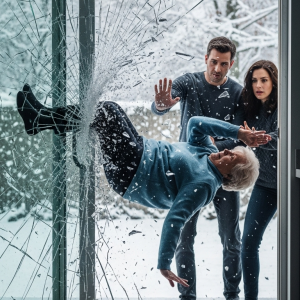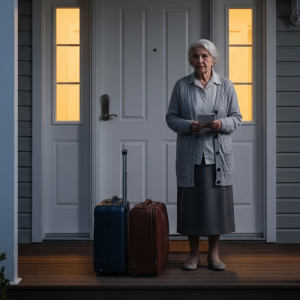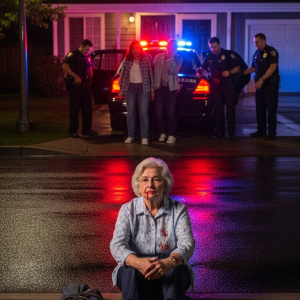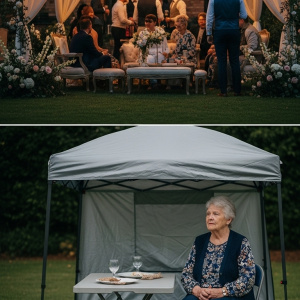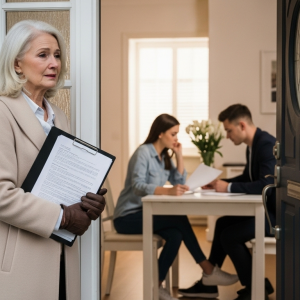On my 72nd birthday, my son invited me on a cruise. I thought it meant he still loved me. But on the third night, a waitress slipped me a napkin that read, “Call 911. There is something in your tea.” My hands went cold. My own son. I wanted to believe it was a mistake, but deep down, I knew. So, what do you do when the person you gave life to decides yours has no value left?
It started with a small envelope under my door. No card, just a printed note: “Pack warm. Boat leaves Friday at 10:00 a.m.” It was from Darren. I hadn’t heard from my son in almost four years, not even when my blood pressure landed me in the ER last winter. So when I saw that note, I didn’t know whether to feel joy or dread.
Two days later, I stood on the pier, clutching a scarf. The cruise ship was modest, a local line. And there he was, my son, waiting with a smile I hadn’t seen since his wedding. His wife, Lyanna, stood beside him, polished and poised, offering a half-hug that was all polite distance.
The room they’d prepared for me was surprisingly lovely, with soft blankets and a framed photo of us from a long time ago. That night at dinner, they sat on either side of me. Lyanna poured me a cup of chamomile tea before I could ask for water. Darren cut my salmon for me as if I were fragile. It was sweet but strange.
They asked about my bookstore, the volunteer nights, the little details of my life they had ignored for years. They were listening, or at least performing the part well. Later, looking out over the dark water from my cabin, I felt a flicker of hope. But for those who’ve lived long enough, you know that sometimes silence has an edge. The calmest moments often come right before the storm.
The air on the second day was crisp, but my body felt oddly heavy. At breakfast, Lyanna greeted me with a bright smile and a steaming mug. “A special blend from Charleston,” she said. “Good for stress.” It smelled of mint and something earthy. After half a cup, my head felt foggy, like someone had turned a dimmer switch on my brain.
She asked about my medications, specifically the little blue pills for my blood pressure. I watched her eyes flick toward her phone as she typed something. Later, on the top deck, Darren handed me a glass of lemonade that tasted slightly off. I set it down, and Lyanna quickly offered a chilled bottle of water from her bag. Their attentiveness was beginning to feel like surveillance.
That night, dinner was in the captain’s lounge. When dessert came, Lyanna reached for the teapot. “A different blend,” she announced. “Lavender, for digestion.” She poured it, stirred in honey, and slid the cup toward me. Her eyes never left it. I pretended to take a sip, then set it down.
Back in my room, the fogginess returned, worse this time, accompanied by a sharp stomach cramp. I lay on the bed, my heart fluttering like a trapped moth. As I looked in the mirror, I noticed a small tremor in my right hand. I didn’t remember shaking before this trip. By sunrise, I knew something was wrong, but I also knew I had to pretend it wasn’t.
Dinner on the third night was quieter. Lyanna and Darren arrived late. The waiter brought tea to the table—just for me, without being asked. Halfway through the meal, I excused myself. As I walked back to my seat, I noticed a young waitress watching Lyanna.
When I reached my chair, I found it. Tucked beneath my folded napkin was a small, torn piece of paper. The shaky words were a punch to the gut: “Call 911. There is something in your tea.” My throat tightened. I calmly slid the note into my purse, my hands trembling beneath the table.
Lyanna smiled and ordered me another tea. The moment the waiter set it down, I could smell it: chamomile mixed with something metallic and faintly sweet, like wilted flowers and copper. I let it sit untouched.
The next morning, I avoided the dining room. I found the same waitress in the mid-deck cafe. She leaned close, speaking low and fast. She was a pharmacology student and had seen my daughter-in-law adding something to my cup. She slipped another note under my saucer and walked away.
In my room, I read the new message. A word: Digoxin. A warning: it could mimic natural heart failure symptoms. My blood ran cold. The door clicked open behind me. It was Darren, smiling too casually, asking if I was feeling okay. He mentioned they’d been looking into care options for me, a quieter condo in Sarasota, and that they’d handle all the paperwork. When he left, I slid a chair under the doorknob.
That afternoon, another unmarked envelope appeared under my door. Inside was a note with a room number—212—and a time: midnight. I had to go. At 11:30 p.m., I slipped out and knocked on the door. The waitress, Maris, let me in.
She handed me a manila envelope. Inside were photos: Lyanna pouring from a small brown bottle into my teacup; Darren outside a pharmacy holding a prescription bag; a timestamped shot of someone slipping a note under my door. “I have a friend in security,” she whispered. “I’ve already sent digital copies to someone I trust, in case anything happens to us.”
She pressed a small voice recorder into my hand. “Keep this hidden,” she said. I returned to my room, the pieces of a truth I already suspected now solid and glossy in my hands. The real storm was just beginning.
The next afternoon, Lyanna visited my cabin. She brought a silk scarf and an envelope of her own. “Just a few forms,” she said, her voice light. “Estate planning. We don’t want to burden you with stress.” She laid it on the table between us. I told her I’d look at it later. That evening, I went to dinner with the voice recorder running in my pocket.
They were laying the groundwork for an early departure, a clean exit. Lyanna poured the tea. I held the warm cup but didn’t drink. Instead, I calmly asked about the forms. “It’s just to make things easier,” Darren said smoothly. “To give you peace.” Later, I opened their envelope. Inside were power of attorney forms and bank authorizations, granting them complete control. I kept it all, untouched. It was evidence.
The next morning, I dressed with care, the recorder in one pocket, the flash drive and photos in another. I requested a meeting with the ship’s legal liaison, Officer Givens. In a private conference room, I laid everything out. I did not cry. I did not shake. I simply told him the truth.
He took the evidence to the ship’s security chief and sent a secure message to my attorney. By lunchtime, Darren and Lyanna were escorted from the dining deck by a crew member. The captain, he’d said, requested a short conversation.
Thirty minutes later, Officer Givens informed me they were being questioned separately and would be confined to their cabins until we docked. He asked if I wanted to press charges. “Not yet,” I said. “First, I need to get home.”
On our final day, I asked the captain for fifteen minutes during the farewell reception. I stood before the other passengers and spoke of quiet integrity. Then I called Maris to the front. I handed her an envelope containing a scholarship certificate for her final year of pharmacology school, funded by a foundation my late husband and I supported. Her hands trembled as she hugged me.
I stepped down from the platform. I wasn’t looking at the guests. I was watching Darren and Lyanna, standing near the back, their faces pale and unreadable. I had given my final report to Officer Givens. I didn’t need to press charges on the ship. My silence now would speak louder than any accusation.
Three weeks later, I sat in my attorney’s office. Every document that named Darren or Lyanna was removed and rewritten. The bookstore I’d run for thirty-two years would become a community foundation. My hand was steady as I initialed every page.
Their attorney sent a letter, claiming they intended to challenge the revisions, suggesting I had been manipulated. My lawyer, Janice, laughed. She responded with a letter of her own, attaching the full investigation report from the cruise line—the photos, the recordings, the witness statements. Three weeks later, another letter arrived: they had withdrawn their claim. Resolved.
Life didn’t return to how it was before. It became clearer. I donated half the contents of my house and repainted the kitchen. Above the fireplace, where a family portrait used to hang, I placed a framed quote: “I am not what was done to me. I am what I choose to do after.”
I heard through the grapevine that Darren and Lyanna had moved to a smaller, quieter town. I never wasted a moment wondering if they were happy. I was too busy living a life that was finally, fully my own. One evening, sitting by the window, I opened my notebook again and wrote a single sentence. You outlived the poison. Now live like you never drank it.
The world didn’t need to know everything I endured. But I needed to remember the woman I became—a woman who once sat in a dining room full of smiling faces and chose, with a steady hand, not to drink. That choice didn’t just save my life. It returned me to myself.
The following autumn, the trees on my street turned a burnt orange that clung to the branches longer than usual. I took morning walks wrapped in a wool coat, the same one I had worn on the cruise, only now it carried the scent of dry leaves and old books. Life didn’t return to how it was before. It became something else—not smaller, not quieter, just clearer.
I donated half the contents of my house, keeping only what held weight in my hands or meaning in my heart. I repainted the kitchen walls a soft cream. I stopped setting the table for three. I even took down the family portrait above the fireplace and replaced it with a framed quote I’d copied in longhand on heavy paper: “I am not what was done to me. I am what I choose to do after.”
The bookstore became a sanctuary. Kora, the new manager, helped me digitize the inventory. We started hosting poetry nights again, sometimes with more candles than guests. But the ones who came stayed late, and they listened. People who had never spoken much began reading aloud. Voices cracked, smiles softened. Something was being rebuilt there, slowly.
Maris wrote to me once a month. Her emails were short, filled with updates about exams and late-night shifts at the hospital lab. In one of them, she told me she had changed her thesis topic. Now, she was researching the long-term metabolic impact of low-dose exposure to certain cardiac medications. She ended that note with a line: “I never pour tea for anyone without watching their eyes.” I replied, “I am proud of you.” And I meant it.
Darren and Lyanna didn’t reach out again. I heard through someone at the bank that they had moved. A smaller town, quieter. I wondered once if they looked at each other differently now, if what they’d done had hardened them, or broken something permanent between them. But then I folded that thought up and let it go. I had no room left for imagining lives that chose to leave mine.
On a crisp Tuesday morning, while shelving a stack of new arrivals, I found a letter in the bookstore’s mail slot. It wasn’t a bill or a catalog. The plain beige envelope had no return address, just the bookstore’s name and address typed neatly. My name was on it, not the store’s.
I opened it carefully. Inside wasn’t a letter, but a simple postcard from a place called “Serenity Springs Wellness Center.” The front showed a placid garden with a weeping willow. On the back was a pre-printed message: “Your journey to healing begins with a single step. We look forward to welcoming you.” Beneath it, a scrawled line of handwriting: “Thought you’d like this place.”
There was no signature. But I knew the script. It was Darren’s. The same script I had taught to form its first letters. My hands didn’t shake. My heart didn’t race. Instead, a strange, almost clinical emptiness settled over me. He wasn’t sending it to me as an apology. He was sending it to Lyanna, using my old address as a sterile go-between—an old habit, a way of speaking without ever having to talk.
He was seeking healing for her, or maybe for them both. He thought a weekend retreat could wash away what they’d done. The thought was so… small. Their betrayal wasn’t a stain to be scrubbed out. It was structural. I looked at the postcard for a long moment. The willow tree looked peaceful, but I knew that serenity couldn’t be purchased or reserved. It had to be built, slowly, from the wreckage.
Kora came out from the back room, holding two mugs of tea. She saw me staring at the postcard and raised an eyebrow. “Junk mail?” she asked. I shook my head, a faint smile touching my lips. “Not exactly,” I said. “Just a reminder that some people never learn how to read a map.”
I didn’t tear it up. I didn’t burn it. I walked to the paper shredder behind the counter, the one we used for old invoices, and fed the postcard into the slot. The machine gave a satisfying thrum, turning the placid garden and its empty words into meaningless strips of confetti. It was gone. Not a part of my story anymore.
That evening was our monthly poetry night. The bookstore was filled with candlelight and the faint scent of cinnamon from the tea Kora had brewed. About twenty people were crowded into the small space, their faces soft in the warm light. I sat in the back, a habit I’d formed, preferring to watch rather than be the center.
A young woman named Lena stepped up to the front. She was new to town, a teacher who’d quit her job after burning out. She’d never read in public before. Her hands, holding a single sheet of paper, trembled just like mine once had.
She began to read. The poem was about silence—the silence imposed on her by a family that didn’t listen, the silence she adopted in a job that drained her soul. But then, the poem shifted. It spoke of finding a crack in the silence, a place where a single word could fit. And then another.
Her voice grew stronger with each line. “They thought my silence was agreement,” she read, her eyes lifting from the page to meet the crowd. “They didn’t know. It was me, reloading.” A ripple of knowing laughter and soft nods went through the room. When she finished, there was a beat of still air, and then applause. Not polite applause. It was the sound of recognition.
I looked around the room. I saw Felicia, the woman I’d met on the cruise, who had spoken of becoming invisible. She was beaming, her eyes bright. I saw the other faces—widows, divorcees, caregivers, people who had spent their lives saying “yes” and were now learning to say “I.”
We had built something here, in this small bookstore. Not a family bound by blood or obligation, but a community bound by shared stories and the courage to speak the truth. This was my legacy. Not the house or the money, but this space, where lost voices could find their way home.
After everyone had left, Kora and I cleaned up in comfortable silence. As I was about to leave, she touched my arm. “That was a good night,” she said. “What you’ve built here… it matters.”
I nodded, a lump forming in my throat. I stepped out into the cool night air. Winter was on its way, but for the first time in a long time, I wasn’t afraid of the cold. I had outlived the poison. I had outlived the silence. And now, I was living. Not for revenge, not in fear, but in my own quiet, powerful truth. And that was a healing more precious than anything money could ever buy.
